Key takeaways
- Russell’s Paradox highlights the complexities of defining sets, pushing us to question foundational assumptions in both philosophy and logic.
- It serves as a tool in philosophy education, fostering critical thinking and encouraging students to embrace uncertainty as part of learning.
- The paradox reveals the importance of precise language and definitions, as small discrepancies can lead to significant logical contradictions.
- Engagement with Russell’s Paradox cultivates intellectual humility, reminding us that some questions may resist clear resolutions and inviting a more reflective approach to reasoning.
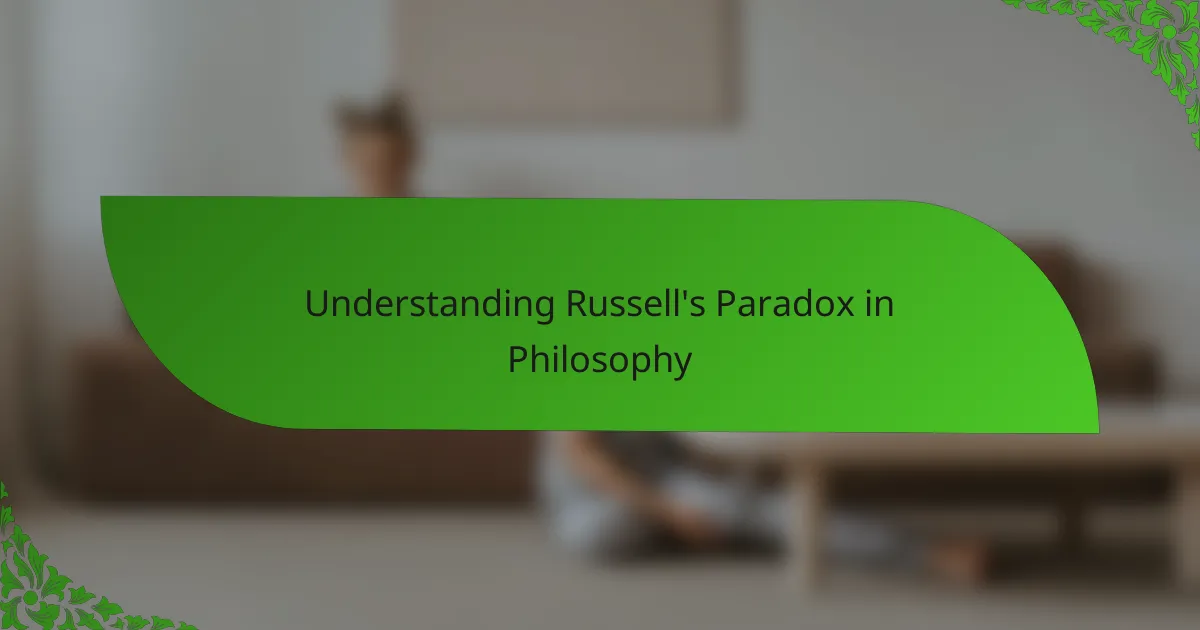
Understanding Russell’s Paradox in Philosophy
Russell’s Paradox really caught my attention when I first encountered it during my studies. It’s fascinating how something as seemingly simple as defining a “set” can lead to such a puzzling contradiction. Have you ever thought about whether a set can contain itself? That question is at the heart of the paradox and shows just how tricky foundational concepts in philosophy and mathematics can be.
When I struggled to grasp the paradox, I realized it wasn’t just a dry logical problem—it exposes the limits of how we categorize the world. The idea that a set of all sets that don’t contain themselves leads to a contradiction made me question the assumptions we often take for granted. It’s almost like a puzzle that refuses to be solved without shaking up the rules we play by.
What struck me most is how Russell’s Paradox challenges the very language we use to describe reality. It’s a reminder that our philosophical inquiries must be careful with definitions, or else we risk falling into logical traps. This paradox feels like an invitation to rethink how we approach knowledge—and that’s what makes studying philosophy so endlessly exciting to me.
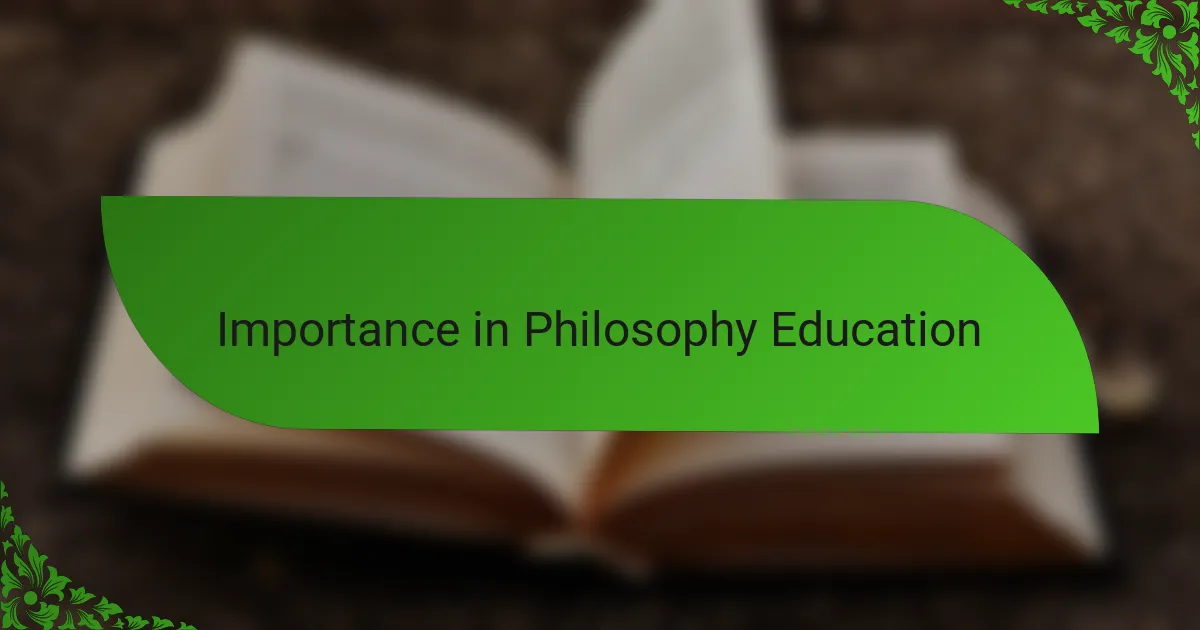
Importance in Philosophy Education
When I first saw Russell’s Paradox woven into philosophy education, I felt it was like a wake-up call for clear thinking. It shows students how even basic concepts need careful scrutiny, which made me appreciate the precision philosophy demands. Have you ever found yourself revisiting a simple idea only to realize it’s far more complex than it seemed?
What really matters is how this paradox teaches us to question assumptions rather than accept them at face value. In my experience, grappling with it caused a shift in my mindset—I started embracing uncertainty as part of learning instead of fearing it. That shift, I believe, is a cornerstone for any philosophical education because it fosters deeper critical thinking skills.
Moreover, Russell’s Paradox acts as a bridge connecting abstract logic with real philosophical concerns about language and meaning. It pushed me to see philosophy not as a set of rigid doctrines but as an evolving conversation. Isn’t that what education should be about—inviting us into ongoing dialogue rather than handing down fixed answers?
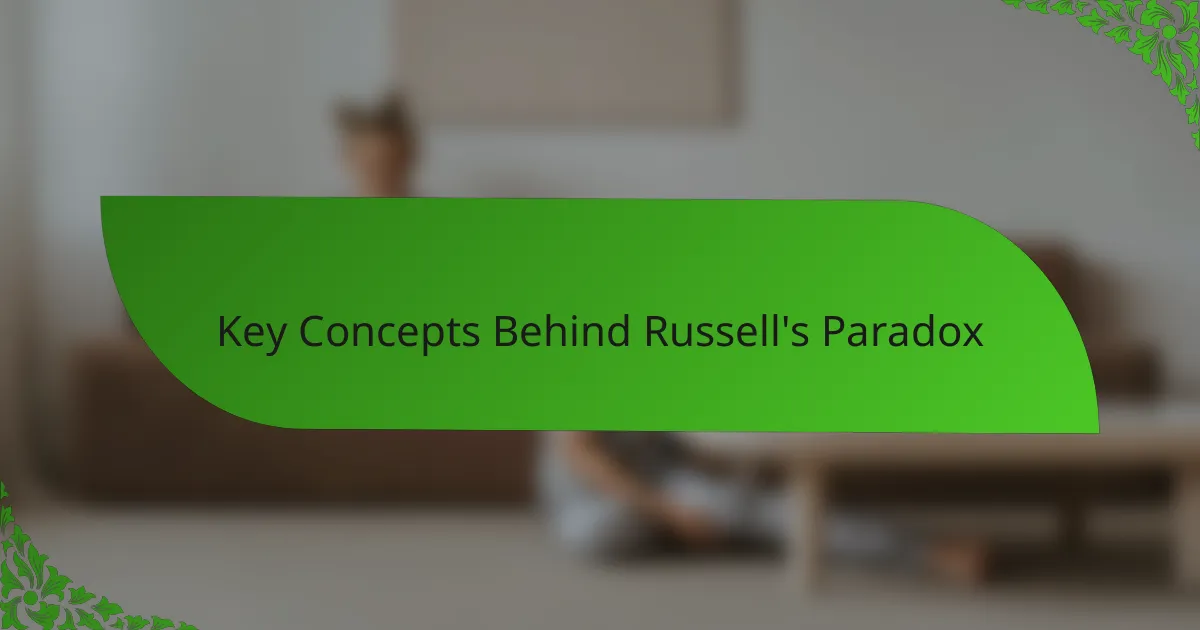
Key Concepts Behind Russell’s Paradox
One key concept behind Russell’s Paradox is the notion of self-reference. When I first encountered the idea of a set containing itself or not, it felt like stepping into a maze with no clear exit. How can something include itself without creating confusion? That tension between inclusion and exclusion is where the paradox quietly arises.
Another crucial aspect is the idea of unrestricted set formation—the assumption that for any given property, you can form a set of all things satisfying that property. Reflecting on it, I realized this seemingly reasonable rule actually opens the door to contradictions. It made me wonder: can there really be a “set of all sets” without running into trouble?
Lastly, the paradox hinges on the delicate balance between language and logic. The way we define sets isn’t just a matter of words; it fundamentally shapes what we believe is possible. This made me keenly aware of how careful we must be when crafting definitions, because even a tiny slip can unravel entire systems of thought. Have you ever considered how much power precise language holds in philosophy?
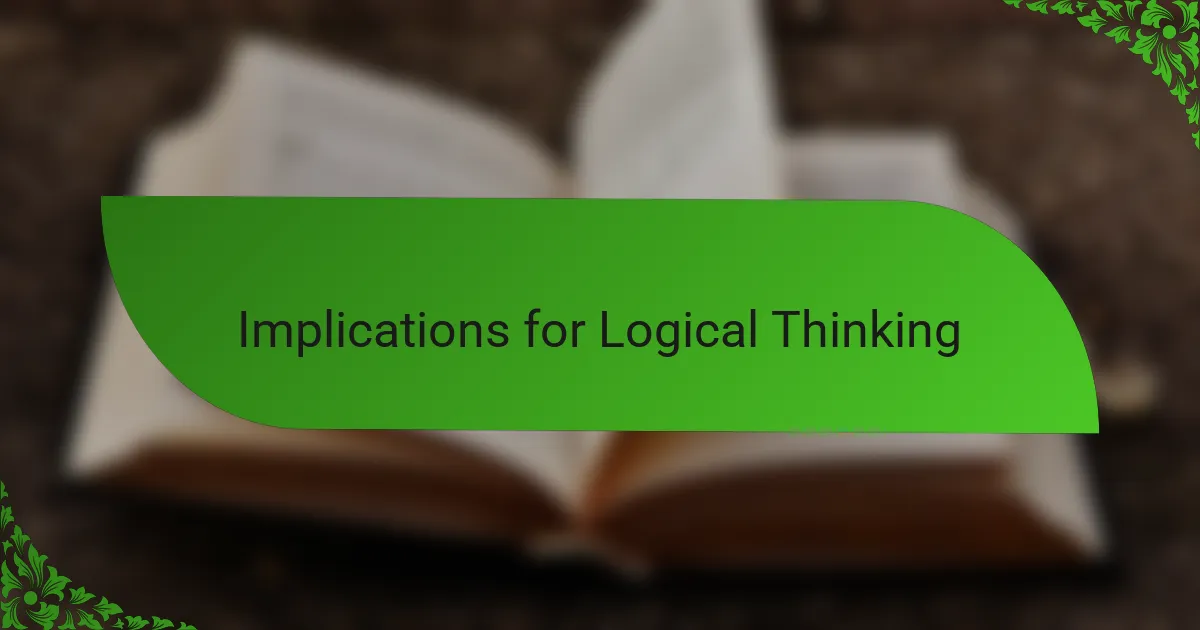
Implications for Logical Thinking
Russell’s Paradox made me rethink what I thought was straightforward about logical reasoning. It highlights how even the most basic assumptions in logic can lead us into unforeseen contradictions, reminding me that logical thinking isn’t just about following rules—it’s about constantly questioning those rules themselves. Have you ever caught yourself assuming something was true simply because it seemed obvious, only to realize it wasn’t?
What really stands out to me is how this paradox forces us to accept that logic has limits. It’s a wake-up call that some problems can’t be solved within existing logical frameworks, pushing us to develop new ways of thinking. This was a humbling realization and made me appreciate the evolving nature of logic, rather than viewing it as fixed or absolute.
In practical terms, grappling with Russell’s Paradox sharpened my attention to detail when analyzing arguments. It taught me to be wary of definitions that appear simple but might hide deeper complexities. How often do we overlook these subtleties in everyday reasoning? For me, this paradox turned logical thinking into a more cautious and reflective practice.
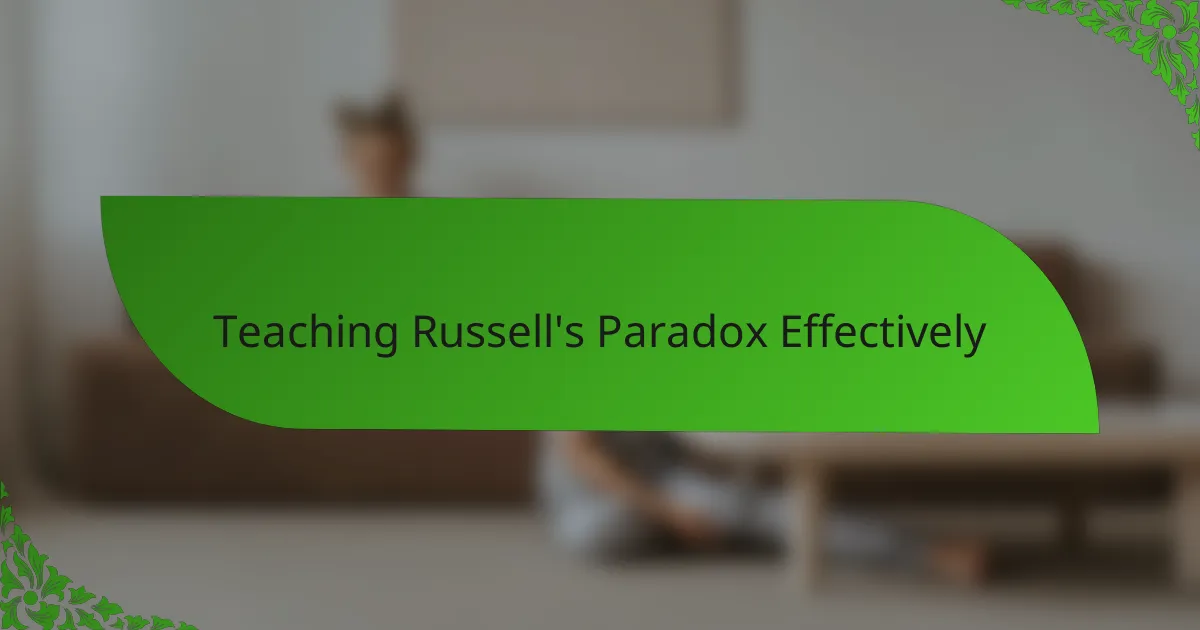
Teaching Russell’s Paradox Effectively
Teaching Russell’s Paradox effectively requires more than just presenting the formal logic—it demands inviting students into the mystery that first gripped me. When I explain the paradox, I like to pose that unsettling question: can a set contain itself? Watching students wrestle with this challenge often reveals their initial discomfort, which I see as a crucial step toward deeper understanding.
From my experience, using concrete examples or simple analogies can make the abstract nature of the paradox less intimidating. For instance, comparing the paradox to a librarian organizing books into categories that suddenly defy all logic helped students grasp the conflicting ideas. Have you tried breaking down complex ideas through stories or relatable scenarios? It can turn confusion into curiosity.
Finally, I’ve found that encouraging open discussion and admitting that the paradox doesn’t have an easy resolution creates a safe space for exploration. Rather than pushing for neat answers, I share how this paradox shifted my own thinking and inspired me to question foundational assumptions. Isn’t teaching about sparking that same sense of wonder and critical inquiry?
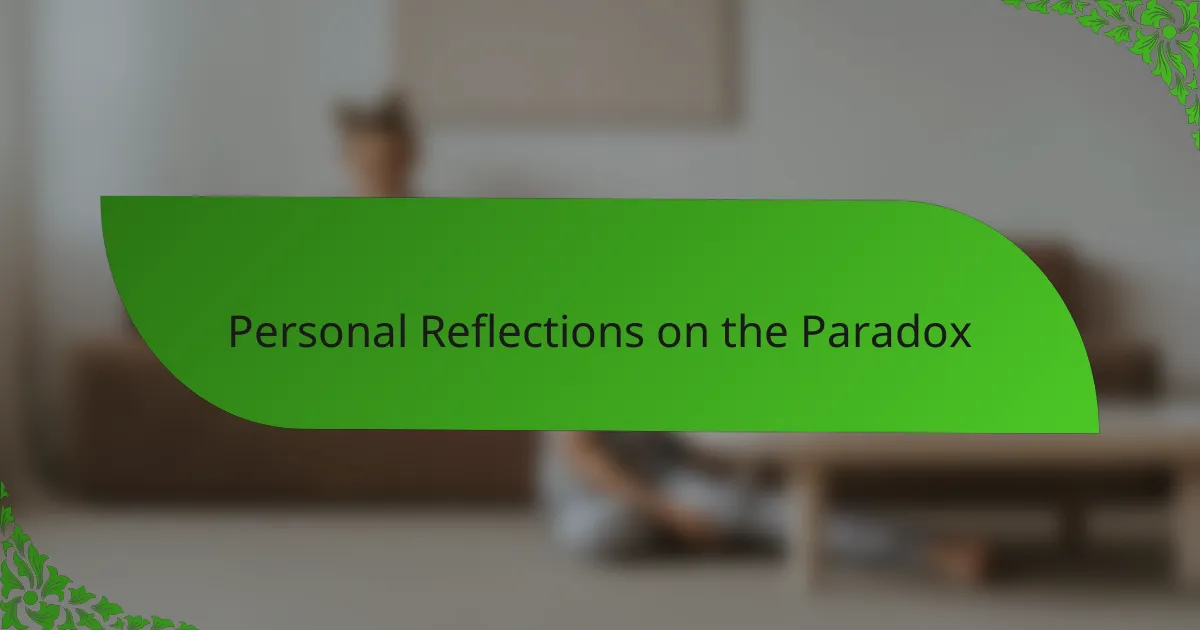
Personal Reflections on the Paradox
Reflecting on Russell’s Paradox, I find myself returning to that initial moment of bewilderment when logic seemed to slip through my fingers. It felt oddly personal—as if the paradox was a challenge tossed directly at my own way of thinking, urging me to confront uncertainty head-on. Have you ever encountered a problem that unsettled you enough to reconsider your mental habits? That’s the kind of intellectual jolt this paradox delivers.
At times, I’ve struggled with frustration, wondering if the paradox is just a trick with no real resolution. Yet, that discomfort turned into fascination because it showed me how philosophy isn’t about tidy conclusions but embracing complexity. This experience deepened my respect for the discipline’s humility—accepting that some questions resist final answers and that’s perfectly okay.
What stays with me most is how Russell’s Paradox encouraged a shift from passive learning to active inquiry. Instead of seeking quick fixes, I began valuing the process of questioning itself. Isn’t that the essence of philosophical growth—to become comfortable with not knowing and excited by the quest to understand more?
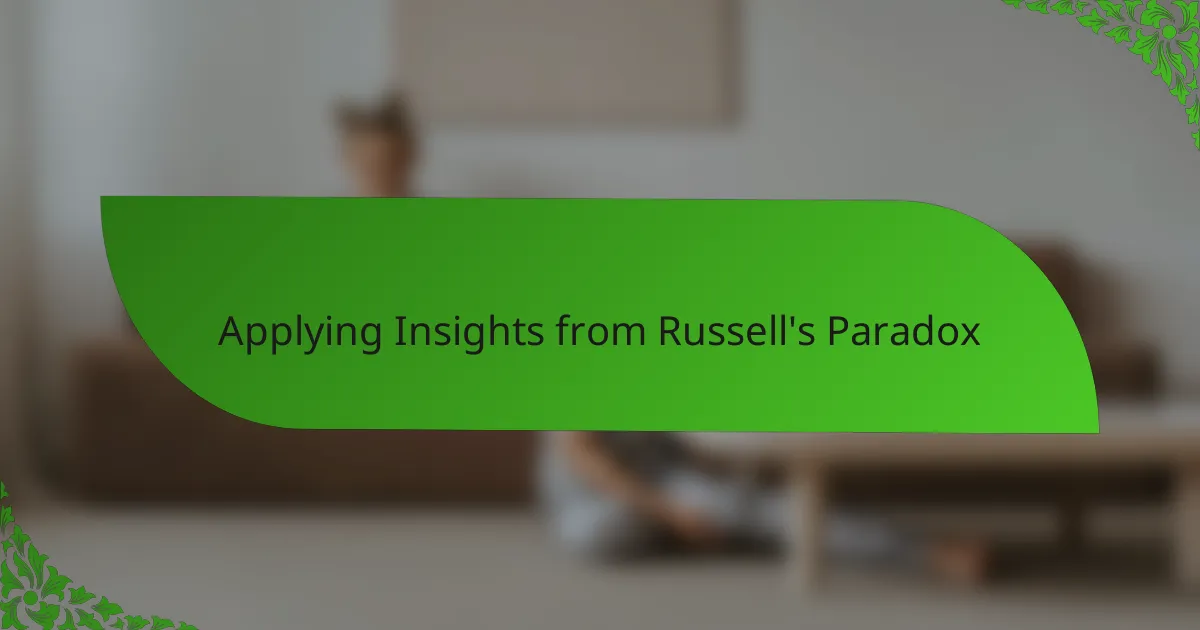
Applying Insights from Russell’s Paradox
Applying insights from Russell’s Paradox has profoundly reshaped how I approach complex problems. When I first realized that some definitions might trap us in logical loops, it pushed me to be more cautious and deliberate in framing ideas. Have you noticed how a single imprecise term can unravel an entire argument? That’s the kind of subtlety this paradox reveals.
I’ve also found that Russell’s Paradox encourages a kind of intellectual humility. It reminds me that not every question has a neat solution within existing frameworks, which can be both frustrating and oddly liberating. In fact, embracing this uncertainty made me more willing to entertain unconventional perspectives rather than dismiss them outright.
Practically speaking, applying the paradox’s lessons means always double-checking assumptions, especially those we take for granted. I remember working on a project where a seemingly simple categorization led to contradictions that echoed Russell’s findings. It was a powerful moment that drove home how foundational clarity is indispensable—not just in philosophy, but in everyday reasoning too.